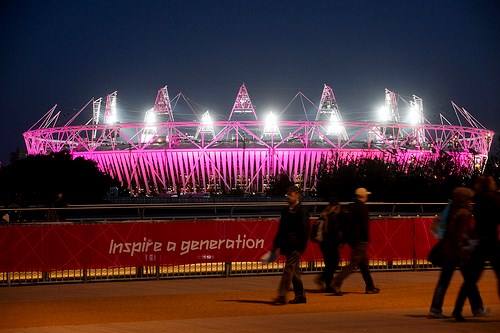Reports claim large profits from the London Olympics

One year after the London Olympics reports claim that the Games were a good investment for Britain, but experts question the numbers. Photo: Department for Culture, Media & Sport/Flickr
01.08.2013
By Søren BangA year after the London Olympics a report financed by the British Government estimates that the Games will bring Great Britain economic benefits between £28 and £41 billion by 2020. But the numbers are questioned.
Britain spent £8.9 billion in public funding creating the infrastructure and the physical surroundings of the London Olympics last year. On top of that is the privately financed spending by the London Organising Committee for the holding of the Olympic and Paralympic games which came to a little over £2 billion.
But according to a new evaluation by the British Department for Culture, Media & Sport published up to the one year anniversary of the London Games, the total investment of £11 billion has turned out to be a good investment for Britain.
The report ’Post-Games Evaluation – Meta-Evaluation of the Impacts and Legacy of the London 2012 Olympic Games and Paralympic Games’ estimates that the Games by 2020 will generate economic benefits of between £28 and £41 billion (Gross Value Added) with a derived increase in employment of between 618.000 and 893.000 years of employment for the UK economy.
The evaluation is prepared by a consortium led by the accounting and consulting firm Grant Thornton, who on behalf of the British Government have analysed the impact of the London Games before, during and after the event.
The direct public investment account for a significant part of the increased economic activity, but above all international trade and inward investments are supposed to bring the bulk of the revenues towards 2020.
‘Creative accounting’
The latter estimate is primarily based on new research from UK Trade & Investment (UKTI), who have found that the Games supported by the UKTI’s own efforts so far have secured economic benefits of around £9.9 billion through increased export sales, foreign investment and so called Olympic-related high-value opportunities won overseas, such as work on other major global sports projects.
But such statements about the extra business and revenues secured by the Olympics are according to critics airy at best and directly misleading at worst.
”It's almost like a bit of creative accounting. There's no way of testing whether what they're saying is really true,” the BBC quoted the sports economist Stefan Szymanski after the release of the report.
BBC’s own economic editor, Stephanie Flanders, also points to the fact that a lot of the business activity that took place around the Olympics would have happened anyway.
"It's not that the Olympics won't have generated a payoff for UK plc - in addition to all that happiness and general raising of our national self-esteem. But if you're going to put numbers on it, I suspect most economists would say they need to be a lot more rigorous than this.”
A third report on the legacy of the Olympics from the British Government and Mayor of London, is of an even more political nature with forewords by prime minister Cameron, IOC president Jacques Rogge and London mayor Boris Johnson who take the new numbers as a proof that critics of the London Olympics were wrong.
More information
Download the reports on the impact of the London Olympics
Download the report by the British Department for Culture, Media & Sport: 'Meta-evaluation of the impacts and legacy of the London 2012 Olympic and Paralympic Games'Download the report from UK Trade & Investment: 'London 2012 – Delivering the Economic Legacy'
Download the joint UK Government and Mayor of London report: Inspired by 2012: The legacy from the London 2012 Olympic & Paralympic Games





